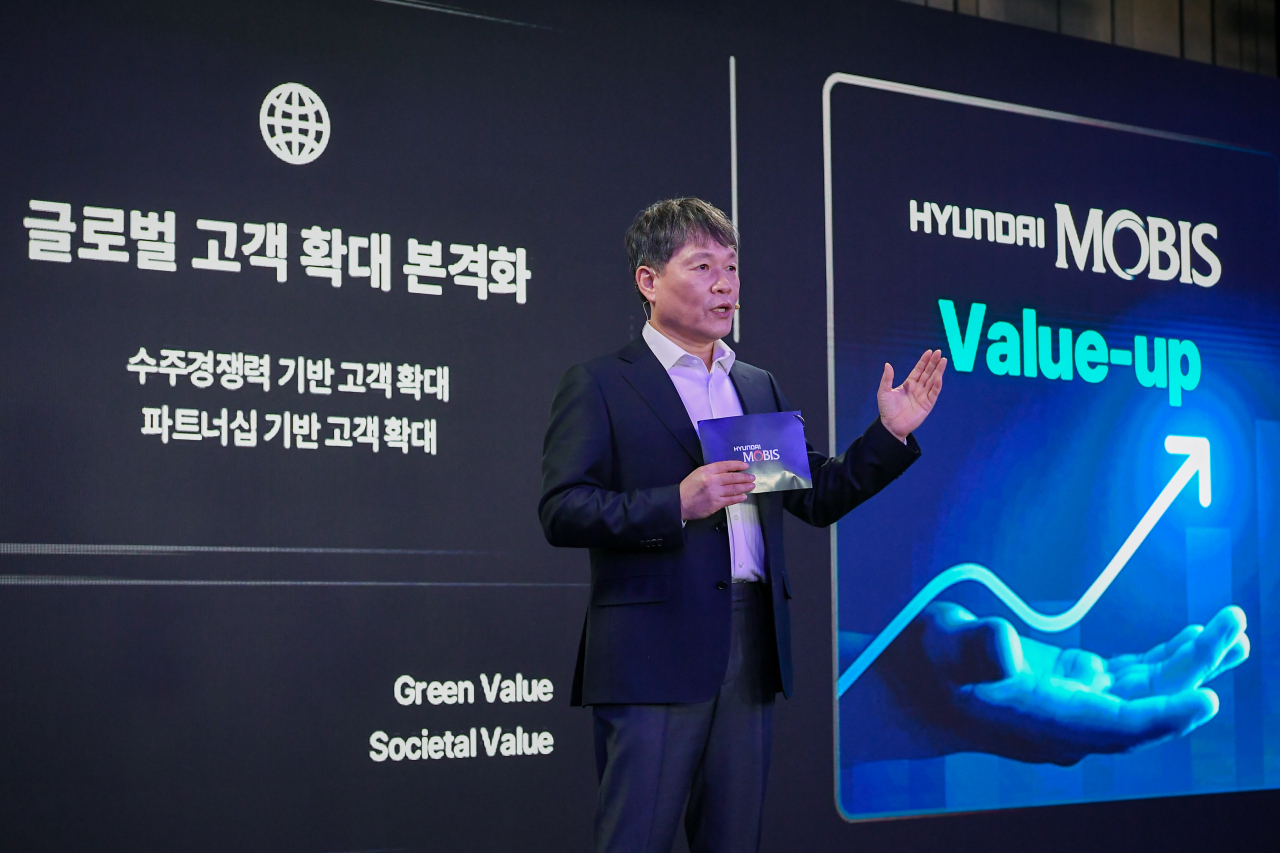
 |
| Hyundai Mobis President and CEO Lee Gyu-suk speaks during the company’s “CEO Investor Day” held in a hotel in Yeouido, Seoul on Tuesday. (Hyundai Mobis) |
Hyundai Mobis, a car parts manufacturing subsidiary of Hyundai Motor Group, has committed to having global automakers account for 40 percent of its client base by leveraging its advanced automotive technology.
“One of our core pillars of a long-term growth strategy is to become the world’s top three auto parts supplier, reducing reliance on Hyundai Motor Co. and Kia," which account for 90 percent of auto parts and system orders, said Axel Maschka, vice president and head of global sales at Hyundai Mobis, during the company’s CEO Investor Day held in a hotel in Seoul on Tuesday.
From 2020 to 2023, Hyundai Mobis’ order volume saw over a fivefold increase to 12.5 trillion won ($9 billion), starting with a chassis module supply deal with Stellantis in 2021. The company also secured orders from Volkswagen and Mercedes-Benz to supply Battery System Assembly -- a key device that delivers electrical energy to motors in electric vehicles -- and chassis modules, respectively.
Maschka stressed that the company is striving to forge partnerships with new customers, noting that several original equipment manufacturers prefer a long-term supply deal on multiple auto platforms, spanning electrical car parts and braking systems, as well as BSA, which could increase profit margins. It also bolsters business ties with its key clients – Stellantis, Volkswagen, Mercedes-Benz, General Motors and Mitsubishi.
This overseas business expansion comes as Hyundai Mobis begins to address the needs of global automakers other than Hyundai Motor and Kia and sets up customer-centric sales organizations to reinforce communications from the research and development phase.
“We will further maximize efficiency in our global operations by establishing a localized decision-making process,” said Hyundai Mobis President and CEO Lee Gyu-suk. “We plan to make local personnel hold key positions in the manufacturing plants and branch offices overseas. By region, there will be local experts taking charge of targeting major OEMs.”
To ramp up its technological competitiveness as a global market leader, Hyundai Mobis is accelerating its readiness for next-generation mobility -- software-driven vehicles that can add new features through software updates.
Regarding electrification, Kim stressed that the company is developing electric drive motor systems for Hyundai Motor’s two Extended-Range Electric Vehicle models set to launch in North America by 2026. EREVs combine drivetrains of gas- and battery-powered cars. For compact EVs, a new 120-kilowatt motor system -- priced at 70 percent of the existing system -- will be developed by the end of next year.
With a comprehensive portfolio in the electric car parts sector, spanning controllers, sensors and infotainment software, Hyundai Mobis plans to start the global promotion of its total solutions service for software-defined vehicles, branded “Vision Link,” next year.
Based on these strategies, the company vowed to achieve an average annual revenue growth of 8 percent and an operating profit margin of 5 to 6 percent by 2027, marking its 50th anniversary.
Hyundai Mobis also shared its commitment to environmental, social and governance management, targeting a 35 percent renewable energy transition rate by 2025 and aiming for 100 percent energy sustainability at its manufacturing sites by the same year.









